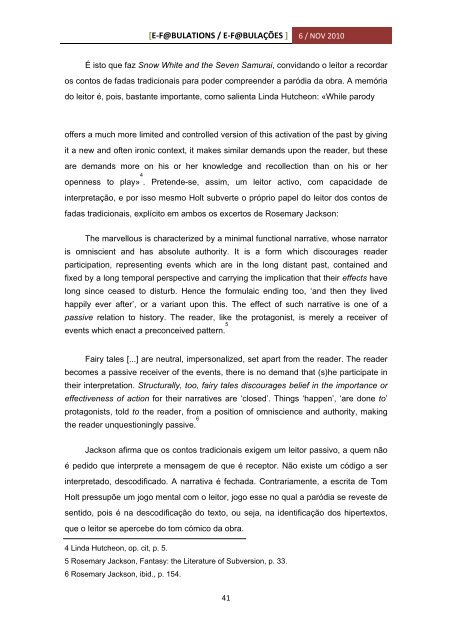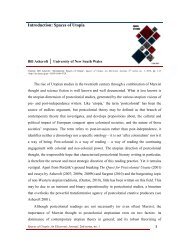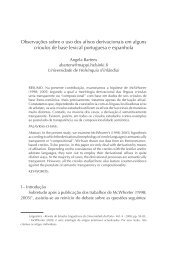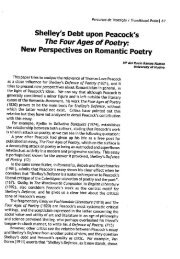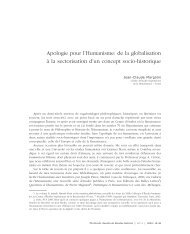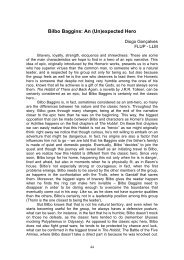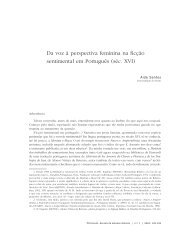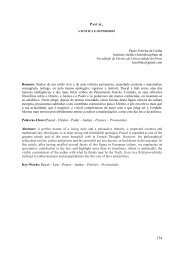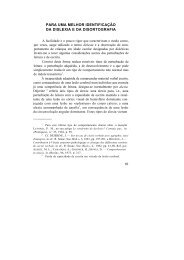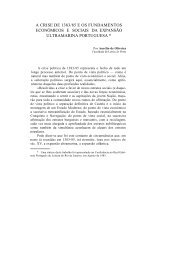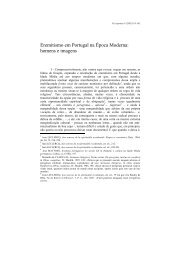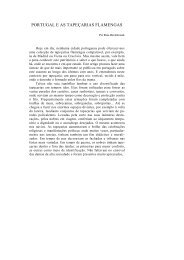e-journal of children's literature - Biblioteca Digital - Universidade do ...
e-journal of children's literature - Biblioteca Digital - Universidade do ...
e-journal of children's literature - Biblioteca Digital - Universidade do ...
You also want an ePaper? Increase the reach of your titles
YUMPU automatically turns print PDFs into web optimized ePapers that Google loves.
[E‐F@BULATIONS / E‐F@BULAÇÕES ] 6 / NOV 2010<br />
É isto que faz Snow White and the Seven Samurai, convidan<strong>do</strong> o leitor a recordar<br />
os contos de fadas tradicionais para poder compreender a paródia da obra. A memória<br />
<strong>do</strong> leitor é, pois, bastante importante, como salienta Linda Hutcheon: «While parody<br />
<strong>of</strong>fers a much more limited and controlled version <strong>of</strong> this activation <strong>of</strong> the past by giving<br />
it a new and <strong>of</strong>ten ironic context, it makes similar demands upon the reader, but these<br />
are demands more on his or her knowledge and recollection than on his or her<br />
openness to play» 4<br />
. Pretende-se, assim, um leitor activo, com capacidade de<br />
interpretação, e por isso mesmo Holt subverte o próprio papel <strong>do</strong> leitor <strong>do</strong>s contos de<br />
fadas tradicionais, explícito em ambos os excertos de Rosemary Jackson:<br />
The marvellous is characterized by a minimal functional narrative, whose narrator<br />
is omniscient and has absolute authority. It is a form which discourages reader<br />
participation, representing events which are in the long distant past, contained and<br />
fixed by a long temporal perspective and carrying the implication that their effects have<br />
long since ceased to disturb. Hence the formulaic ending too, ‘and then they lived<br />
happily ever after’, or a variant upon this. The effect <strong>of</strong> such narrative is one <strong>of</strong> a<br />
passive relation to history. The reader, like the protagonist, is merely a receiver <strong>of</strong><br />
events which enact a preconceived pattern. 5<br />
Fairy tales [...] are neutral, impersonalized, set apart from the reader. The reader<br />
becomes a passive receiver <strong>of</strong> the events, there is no demand that (s)he participate in<br />
their interpretation. Structurally, too, fairy tales discourages belief in the importance or<br />
effectiveness <strong>of</strong> action for their narratives are ‘closed’. Things ‘happen’, ‘are <strong>do</strong>ne to’<br />
protagonists, told to the reader, from a position <strong>of</strong> omniscience and authority, making<br />
the reader unquestioningly passive. 6<br />
Jackson afirma que os contos tradicionais exigem um leitor passivo, a quem não<br />
é pedi<strong>do</strong> que interprete a mensagem de que é receptor. Não existe um código a ser<br />
interpreta<strong>do</strong>, descodifica<strong>do</strong>. A narrativa é fechada. Contrariamente, a escrita de Tom<br />
Holt pressupõe um jogo mental com o leitor, jogo esse no qual a paródia se reveste de<br />
senti<strong>do</strong>, pois é na descodificação <strong>do</strong> texto, ou seja, na identificação <strong>do</strong>s hipertextos,<br />
que o leitor se apercebe <strong>do</strong> tom cómico da obra.<br />
4 Linda Hutcheon, op. cit, p. 5.<br />
5 Rosemary Jackson, Fantasy: the Literature <strong>of</strong> Subversion, p. 33.<br />
6 Rosemary Jackson, ibid., p. 154.<br />
41


